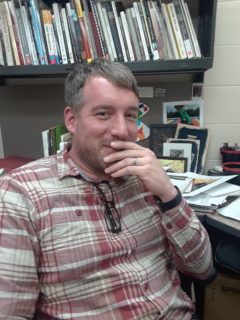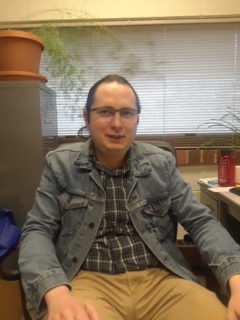Faculty free time
November 6, 2018
The Student Voice is excited to revive a "Staff Hobby" column, where we showcase UW-River Falls staff and faculty members with interesting hobbies or interests. It's an attempt to make staff more approachable to students, as well as a place for staff to show off their accomplishments.
If you're interested in having your interesting hobbies showcased, contact reporter Kacey Joslin at Kassaundra.Joslin@my.uwrf.edu.
This month’s noteworthy staff members include Brett Kallusky and Samuel Alvarado.

Brett Kallusky is an Assistant Professor of Art, with an emphasis in photography. He’s currently teaching two photography courses, a design foundation course is a student advisor and serves on numerous committees for the art department and for the University.
Although Kallusky claims to have little free time during the school year, when he has the opportunity, he goes fly fishing. “Fly fishing is important to me as a way of decompressing and clearing my head. I don’t know if I’m that good at it, I think I’m still learning, but I’ve been doing it for five years now. A good friend of mine taught me how to do it on the Kinni here, and I was hooked after that.”
Puns aside, Kallusky had some experience casting lines. “A guy I worked for - I used to do construction, and he was a photographer as well - taught me how to cast from the third story of the house that he lived in. The next door building had a satellite dish, and he said, ‘As soon as you can hear the "ding" of the line on the satellite dish, then you know you’re aiming for the right target.’ So, that was in Wrigleyville, Chicago, on the north side. The first time I learned to cast wasn’t even on water, but three stories up in Chicago.”
Since then, Kallusky claims to have caught some trout and bass while fishing in the lower Kinni.
For students that may be inspired by his hobby, he has some advice: “Take your time. I think it’s easy to get frustrated with fly fishing in particular because it’s a very technically-oriented, detail-oriented hobby. But I think the more time you spend with it and the more time you pay attention to your surroundings - like the water, and being out in nature - the more relaxing it gets.” His favorite place to fish is on the Rush River near Martell, WI.

Sam Alvarado is an Assistant Professor of Inorganic Chemistry. Simplified, inorganic chemistry is “the chemistry of the whole periodic table, basically,” Alvarado explained.
But his life doesn’t just revolve around science; “I’ve known how to play the cello since I was ten. It’s kind of a hobbyist thing,” Alvarado said.
According to Alvarado, the most difficult aspect of learning an instrument at a young age is puberty. “Your arms one day are really long, and one day your torso decides to finally catch up on it. The hardest part when you’re a kid is just trying to get the instrument to comply with how you’re growing. They start on these little ones - they give you a half-size, three-quarters size to start on - and then you’re stuck, right around middle school or so, playing an instrument that’s way too big for you or too small for you. Nobody has the right size cello when they’re in middle school. It’s kind of funny.”
Although he’s played the instrument since childhood, Alvarado doesn’t claim to very accomplished. “I don’t play in real orchestras or anything like that,” Alvarado said. “But I did play all the way through college. I liked making music and having a distraction from all the science I was doing in school. I liked being able to go be creative outside of that area. The other instrument I can play is the electric bass. I taught myself that in college,” Alvarado added.
“I had enough transferable skills from the cello to learn electric bass. That one wasn’t so much learning with a teacher in a studio, that was just me -- at that point, I had a good enough ear that I could listen to something on the radio and pick it apart.”
Alvarado had a piece of advice for college students interested in picking up an instrument or two. “I hate telling people to ‘practice’, as crazy as it sounds, but there is a time commitment to pursuing something like that. You do have to set aside time to do it, and it depends greatly on how you make the most of your time. Sometimes when you’re in orchestra, you have to just really practice something; and I put that in scary capital letters when I say that. What that means is, if there’s a part I just can’t play, you take it into the practice room and just go on it, using whatever practice techniques you know until you can finally get that thing right,” Alvarado advises. “Sometimes you can just jam, too. That’s more fun.”
Alvarado adds that students shouldn’t be afraid to make mistakes. They’re allowed to be curious and ask questions to anyone who’s willing to answer; a philosophy can be applied to most pursuits, both scientific and musical.
